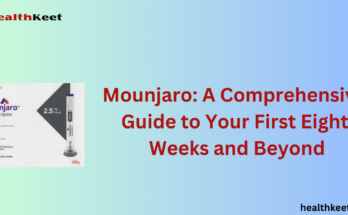Understanding Ozempic: The Science Behind Weight Loss
Ozempic, known scientifically as semaglutide, is a glucagon-like peptide-1 (GLP-1) receptor agonist. This medication emulates the effects of GLP-1, a hormone produced in the gut that regulates hunger, blood sugar, and gastric emptying. Key mechanisms of Ozempic include:
- Appetite Suppression: By activating GLP-1 receptors, Ozempic effectively diminishes hunger and cravings, facilitating adherence to a calorie-restricted diet.
- Delayed Gastric Emptying: This prolongs the sensation of fullness by slowing the rate at which food exits the stomach.
- Blood Sugar Regulation: Ozempic aids in maintaining stable blood sugar levels by stimulating insulin production and reducing glucagon release, which can indirectly support weight loss.
Week-by-Week Overview: The Ozempic Weight Loss Timeline

Individual responses to Ozempic can vary. However, a typical 6-week Ozempic weight loss journey might unfold as follows:
- Weeks 1 & 2: The Initiation Phase – Early adjustments and initial changes in appetite and satiety.
- Weeks 3 & 4: The Acceleration Phase – Increased weight loss as the dosage reaches therapeutic levels and the body adapts to the medication.
- Weeks 5 & 6: The Momentum Phase – Continued Ozempic weight loss with the cumulative effects of the medication and lifestyle changes.
Key Factors Influencing Ozempic Weight Loss Success
Several factors affect the effectiveness of Ozempic in weight management over a 6-week period:
- Dosage: Gradual increases in dosage typically enhance weight loss. Higher doses are generally associated with more significant results.
- Starting Weight: Individuals with a higher initial weight may experience more rapid initial weight loss.
- Lifestyle Factors: Combining Ozempic with a balanced diet and regular exercise is crucial for maximizing weight loss and achieving long-term sustainability.
- Individual Differences: Genetic factors, metabolic rate, and overall health can influence individual responses to the medication.
Beyond Medication: The Importance of Lifestyle Changes
Ozempic is a potent tool for weight loss, but its benefits are amplified when combined with lifestyle modifications:
- Diet Modification: Implementing a nutritious, calorie-controlled diet.
- Regular Exercise: Engaging in consistent physical activity.
- Sleep: Ensuring adequate, quality sleep.
- Stress Management: Managing stress effectively to support overall health.
- Hydration: Maintaining proper hydration levels.
Monitoring and Tracking Progress
To optimize your Ozempic weight loss journey with Ozempic, regular tracking is essential:
- Weight and Measurements: Monitoring changes in weight and body measurements.
- Journaling: Keeping a record of dietary intake, exercise, and any side effects.
- Regular Check-ups: Scheduling follow-ups with your healthcare provider to assess progress and make necessary adjustments.
Consultation and Guidance
Consulting your healthcare provider is essential for tailoring Ozempic treatment to your needs. They will evaluate your medical history, discuss your goals, and develop a personalized treatment plan.
Important Considerations
- Side Effects: Common side effects include nausea, diarrhea, vomiting, constipation, abdominal pain, and headache. These are generally mild and tend to diminish with continued use.
- Suitability: Ozempic is primarily prescribed for individuals with type 2 diabetes. For weight management in individuals without diabetes, a higher-dose variant known as Wegovy is available. Consult your doctor to determine the appropriate medication.
- Long-Term Effects: Ongoing research is examining the long-term effects of Ozempic for weight loss. Stay informed about the latest developments.
Frequently Asked Questions
- How much Ozempic weight can I realistically expect to lose on Ozempic within 6 weeks?
Weight loss varies based on dosage, starting weight, adherence to lifestyle changes, and individual response. Many users report significant Ozempic weight loss within the initial 6 weeks. - Will I see immediate Ozempic weight loss results ?
Significant Ozempic weight loss typically begins around weeks 3 or 4 as your body adjusts to the medication and dosage increases. - Can I take Ozempic if I don’t have diabetes?
Ozempic is primarily for type 2 diabetes. For weight management in individuals without diabetes, Wegovy, a higher-dose version of semaglutide, is recommended. - Are there any side effects associated with Ozempic?
Common side effects include nausea, diarrhea, and abdominal discomfort. These side effects are generally mild and subside over time. - Is Ozempic a long-term solution for weight loss?
Ozempic is intended to be part of a comprehensive weight management strategy that includes diet and exercise. Long-term effects are still being studied. - How does Ozempic differ from other weight loss medications?
As a GLP-1 receptor agonist, Ozempic mimics natural hormones to regulate appetite and blood sugar, unlike some medications that directly stimulate the central nervous system. - Can I stop taking Ozempic after 6 weeks if I’ve reached my weight loss goals?
Consult your doctor before discontinuing Ozempic to determine the best course of action for maintaining your weight loss and overall health. - Is Ozempic covered by insurance?
Coverage varies by insurance plan and the medication’s intended use. Check with your insurance provider for details on coverage options.



















